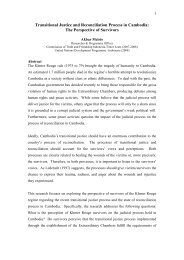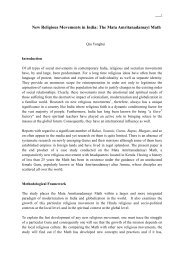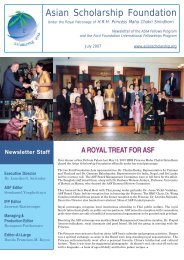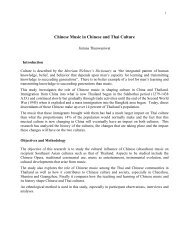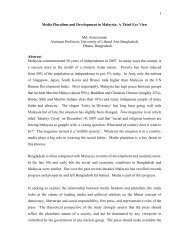Private Sector Participation in Affirmative Action in Malaysia: - Asian ...
Private Sector Participation in Affirmative Action in Malaysia: - Asian ...
Private Sector Participation in Affirmative Action in Malaysia: - Asian ...
Create successful ePaper yourself
Turn your PDF publications into a flip-book with our unique Google optimized e-Paper software.
fact, the PDA proved such an <strong>in</strong>trusive law that Esso <strong>Malaysia</strong>, an oil company decided<br />
to pull out f its oil exploration efforts pend<strong>in</strong>g a more favorable policy. Several other<br />
companies threatened to follow Esso’s path. After a long negotiations, the government<br />
decided to drop the idea of management share was dropped and its strongest advocate<br />
Tengku Razaleigh Hamzah was transferred from his job as Chairman of Petronas <strong>in</strong> 1976.<br />
Similarly, on ICA the government conceded too many demands of the mult<strong>in</strong>ationals.<br />
In other words, when it came to foreign companies, most of the leaders were sufficiently<br />
flexible and ready to walk miles to accommodate their concerns. This was <strong>in</strong> complete<br />
contrast to their response to Ch<strong>in</strong>ese demands to repeal ICA and related <strong>in</strong>struments that<br />
adversely impacted their bus<strong>in</strong>ess. Such <strong>in</strong>centives and policy flexibility shown by Malay<br />
leadership conv<strong>in</strong>ced the MICCI, the foreign bus<strong>in</strong>ess chamber to accept the NEP as a<br />
fait accompli and merely press for the removal of the excesses and <strong>in</strong>consistencies <strong>in</strong> the<br />
ICA. The chamber was not will<strong>in</strong>g to unnecessarily alienate the government by ask<strong>in</strong>g to<br />
repeal it (Jesudason, 1990). In short, there was clear trade-off between the state and<br />
foreign companies <strong>in</strong> the context of the NEP.<br />
To sum up the trends and dynamics of private sector participation <strong>in</strong> affirmative action as<br />
laid out by the NEP, one saw a sort of mixed trends of responses and trade-offs. In terms<br />
of responses, they ranged from outright antagonism to reluctant participation although it<br />
differed from one group to the other. While Ch<strong>in</strong>ese vehemently opposed NEP<br />
restrictions <strong>in</strong> the beg<strong>in</strong>n<strong>in</strong>g, yet as time progressed and pressures to fall <strong>in</strong> the l<strong>in</strong>e<br />
persisted, majority of big and medium firms agreed to restructure ownership and<br />
issue management shares to Petronas. Each management share had 500 votes. Further, management shares<br />
shall constitute 1 per cent or more of the issued and paid up capital and such a proportion must be<br />
ma<strong>in</strong>ta<strong>in</strong>ed at all times. In other words, the new clause allowed Petronas to have strategic control of the oil<br />
<strong>in</strong>dustry. In addition, the amendment provided extensive powers to the Prime M<strong>in</strong>ister to regulate the oil<br />
<strong>in</strong>dustry. There were penalties proposed to be <strong>in</strong>troduced <strong>in</strong> case of breach of such regulations. This was<br />
strongly opposed by oil MNCs and most of them suspended further <strong>in</strong>vestment <strong>in</strong> the sector. As a result of<br />
vociferous opposition, the government f<strong>in</strong>ally relented and deleted the idea of management shares and also<br />
the licens<strong>in</strong>g of downstream activities. This was a clear case of government try<strong>in</strong>g to follow an<br />
accommodat<strong>in</strong>g path with foreign <strong>in</strong>vestors who had advantages of capital and technology.<br />
17 The Petroleum Act that covered petroleum and natural gas sector unilaterally cancelled the previous oil<br />
production arrangements with oil MNCs. But what was worse was 1975 amendment which sought to ga<strong>in</strong><br />
control cheaply of companies <strong>in</strong> the distribution, market<strong>in</strong>g, and ref<strong>in</strong><strong>in</strong>g products. The amendment<br />
empowered the government to make these companies issue special class of management share to the<br />
national oil company, Petronas. These share were to be sold at the cost of an ord<strong>in</strong>ary share, but would<br />
carry vot<strong>in</strong>g power of 500 ord<strong>in</strong>ary shares (For details discussion see: Jesudason, 1990).<br />
22



